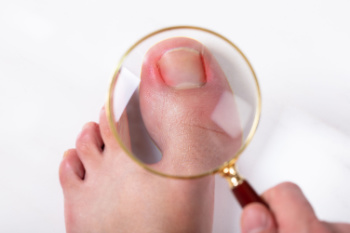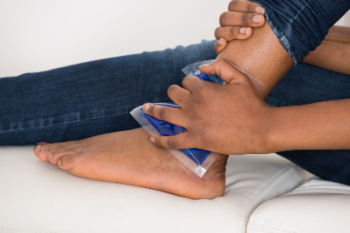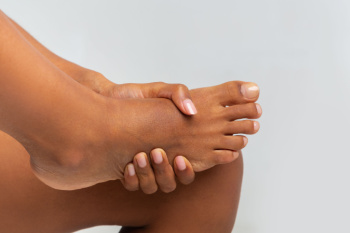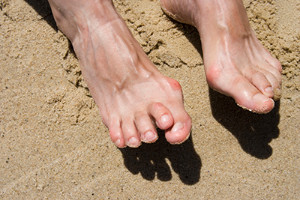
Toenail pain can have many causes, and identifying the source is important for effective relief. One of the most frequent culprits is an ingrown toenail, where the nail digs into the skin and creates irritation or infection. Trauma, such as stubbing your toe or wearing shoes that are too tight, can also lead to pain, discoloration, or even nail loss. Fungal infections may cause the nail to become thick, brittle, or crumbly, often with discomfort or sensitivity. Less commonly, underlying conditions such as arthritis or nerve issues can cause pressure or burning around the toenails. Home remedies may provide temporary relief, but persistent pain should not be ignored. Ignoring the problem can lead to worsening symptoms or permanent nail damage. If you experience ongoing or unexplained toenail pain, it is suggested that you see a podiatrist for a diagnosis and appropriate treatment.
Ingrown toenails may initially present themselves as a minor discomfort, but they may progress into an infection in the skin without proper treatment. For more information about ingrown toenails, contact one of our podiatrists of Pocono Foot & Ankle Consultants. our doctors can provide the care you need to keep you pain-free and on your feet.
Ingrown Toenails
Ingrown toenails are caused when the corner or side of a toenail grows into the soft flesh surrounding it. They often result in redness, swelling, pain, and in some cases, infection. This condition typically affects the big toe and may recur if it is not treated properly.
Causes
- Improper toenail trimming
- Genetics
- Improper shoe fitting
- Injury from pedicures or nail picking
- Abnormal gait
- Poor hygiene
You are more likely to develop an ingrown toenail if you are obese, have diabetes, arthritis, or have any fungal infection in your nails. Additionally, people who have foot or toe deformities are at a higher risk of developing an ingrown toenail.
Symptoms
Some symptoms of ingrown toenails are redness, swelling, and pain. In rare cases, there may be a yellowish drainage coming from the nail.
Treatment
Ignoring an ingrown toenail can have serious complications. Infections of the nail border can progress to a deeper soft-tissue infection, which can then turn into a bone infection. You should always speak with your podiatrist if you suspect you have an ingrown toenail, especially if you have diabetes or poor circulation.
If you have any questions, please feel free to contact our offices located in Stroudsburg, Nazareth, and Easton, PA . We offer the newest diagnostic and treatment technologies for all your foot care needs.

Ankle injuries, including sprains, strains, and fractures, are common and can range from mild to severe. Treatment depends on the type and extent of the injury. For minor sprains, rest, compression, and elevation can be effective. Supportive bracing and gentle stretching may follow once swelling decreases. More serious injuries may require immobilization in a boot or cast, especially if ligaments are torn or bones are fractured. Specific stretches can help to restore strength, balance, and range of motion. In rare cases, surgery may be needed to repair severe ligament damage or unstable fractures. Prompt attention and a clear treatment plan support better recovery and help prevent chronic instability or future injury. If you have ankle pain, swelling, or difficulty bearing weight after an injury, it is suggested you see a podiatrist for a diagnosis and appropriate treatment.
Ankle pain can have many different causes and the pain may potentially be serious. If you have ankle pain, consult with one of our podiatrists from Pocono Foot & Ankle Consultants. our doctors will assess your condition and provide you with quality foot and ankle treatment.
Ankle pain is any condition that causes pain in the ankle. Due to the fact that the ankle consists of tendons, muscles, bones, and ligaments, ankle pain can come from a number of different conditions.
Causes
The most common causes of ankle pain include:
- Types of arthritis (rheumatoid, osteoarthritis, and gout)
- Ankle sprains
- Broken ankles
- Achilles tendinitis
- Achilles tendon rupture
- Stress fractures
- Tarsal tunnel syndrome
- Plantar fasciitis
Symptoms
Symptoms of ankle injury vary based upon the condition. Pain may include general pain and discomfort, swelling, aching, redness, bruising, burning or stabbing sensations, and/or loss of sensation.
Diagnosis
Due to the wide variety of potential causes of ankle pain, podiatrists will utilize a number of different methods to properly diagnose ankle pain. This can include asking for personal and family medical histories and of any recent injuries. Further diagnosis may include sensation tests, a physical examination, and potentially x-rays or other imaging tests.
Treatment
Just as the range of causes varies widely, so do treatments. Some more common treatments are rest, ice packs, keeping pressure off the foot, orthotics and braces, medication for inflammation and pain, and surgery.
If you have any questions, please feel free to contact our offices located in Stroudsburg, Nazareth, and Easton, PA . We offer the newest diagnostic and treatment technologies for all your foot care needs.

Foot health is essential, yet often neglected, and keeping your feet clean is key to preventing bacterial, fungal, and microbial infections. Feet are vulnerable to conditions like athlete’s foot, toenail fungus, and other infections due to moisture, poor hygiene, and tight shoes. Without proper care, these infections can thrive, causing itching, redness, swelling, and a strong odor. Skin may crack or blister, and toenails can thicken, discolor, or become brittle. To prevent these issues, it is important to regularly wash and thoroughly dry your feet, especially between the toes, to eliminate excess moisture where bacteria and fungi grow. Wearing clean socks and breathable shoes also helps keep your feet healthy. A podiatrist can help diagnose and treat infections with antifungal medications and offer advice on foot hygiene and prevention. If you notice any foot problems or suspect an infection, it is suggested that you make an appointment with a podiatrist to protect your feet and overall health.
Everyday foot care is very important to prevent infection and other foot ailments. If you need your feet checked, contact one of our podiatrists from Pocono Foot & Ankle Consultants. our doctors can provide the care you need to keep you pain-free and on your feet.
Everyday Foot Care
Often, people take care of their bodies, face and hair more so than they do for their feet. But the feet are a very important aspect of our bodies, and one that we should pay more attention to. Without our feet, we would not be able to perform most daily tasks.
It is best to check your feet regularly to make sure there are no new bruises or cuts that you may not have noticed before. For dry feet, moisturizer can easily be a remedy and can be applied as often as necessary to the affected areas. Wearing shoes that fit well can also help you maintain good foot health, as well as making it easier to walk and do daily activities without the stress or pain of ill-fitting shoes, high heels, or even flip flops. Wearing clean socks with closed shoes is important to ensure that sweat and bacteria do not accumulate within the shoe. Clean socks help to prevent Athlete’s foot, fungi problems, bad odors, and can absorb sweat.
If you have any questions please feel free to contact our offices located in Stroudsburg, Nazareth, and Easton, PA . We offer the newest diagnostic and treatment technologies for all your foot and ankle needs.

As people age, changes in foot structure and walking style can lead to common toe problems. Seniors with flat feet, or pes planus, may be more likely to develop hammertoes and overlapping toes due to the way pressure is distributed when walking. In contrast, high arches, called cavus foot posture, do not appear to be linked to these specific concerns. Older adults who have a pronated foot function, meaning their feet roll inward while walking, may face a higher risk of developing bunions and overlapping toes. Those with supinated feet, which roll outward, may be less likely to develop bunions and big toe stiffness. Since foot posture often changes with age, it is important for seniors to have their foot health checked regularly. Early recognition of abnormal patterns can help reduce discomfort and prevent future complications. If you are a senior experiencing foot or toe problems, it is suggested that you see a podiatrist for a proper diagnosis and treatment.
Hammertoe
Hammertoes can be a painful condition to live with. For more information, contact one of our podiatrists from Pocono Foot & Ankle Consultants. our doctors will answer any of your foot- and ankle-related questions.
Hammertoe is a foot deformity that affects the joints of the second, third, fourth, or fifth toes of your feet. It is a painful foot condition in which these toes curl and arch up, which can often lead to pain when wearing footwear.
Symptoms
- Pain in the affected toes
- Development of corns or calluses due to friction
- Inflammation
- Redness
- Contracture of the toes
Causes
Genetics – People who are genetically predisposed to hammertoe are often more susceptible
Arthritis – Because arthritis affects the joints in your toes, further deformities stemming from arthritis can occur
Trauma – Direct trauma to the toes could potentially lead to hammertoe
Ill-fitting shoes – Undue pressure on the front of the toes from ill-fitting shoes can potentially lead to the development of hammertoe
Treatment
Orthotics – Custom made inserts can be used to help relieve pressure placed on the toes and therefore relieve some of the pain associated with it
Medications – Oral medications such as anti-inflammatories or NSAIDs could be used to treat the pain and inflammation hammertoes causes. Injections of corticosteroids are also sometimes used
Surgery – In more severe cases where the hammertoes have become more rigid, foot surgery is a potential option
If you have any questions please contact our offices located in Stroudsburg, Nazareth, and Easton, PA . We offer the newest diagnostic and treatment technologies for all your foot and ankle needs.
